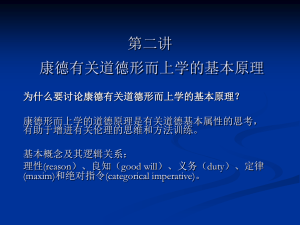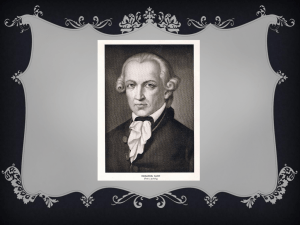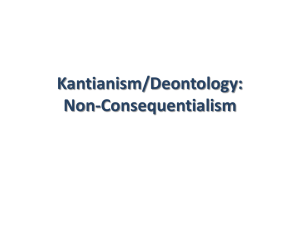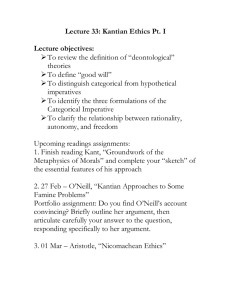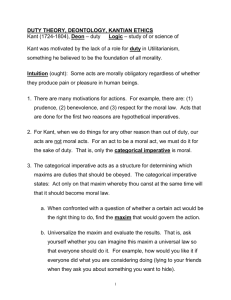Grounding for the Metaphysics of Morals
advertisement
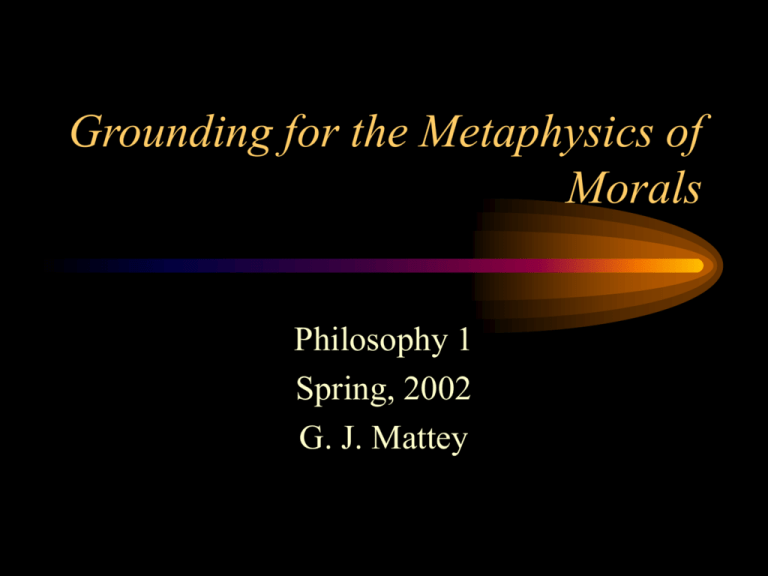
Grounding for the Metaphysics of Morals Philosophy 1 Spring, 2002 G. J. Mattey Ethics • Material philosophy has to do with specific objects and the laws governing them – Physics is the science of the laws of nature – Ethics is the science of the laws of freedom • Ethics has an empirical part, in that its laws concern a human will that is affected by nature • The moral law concerns what ought to happen but may not in fact happen The Moral Law • The moral law is the a priori part of ethics – It contains nothing empirical • It governs with absolute necessity • It applies to all rational beings and does not depend on the nature of man or the circumstances in the world • It must be sought in pure reason • The moral law must guide our actions if they are to be good Good Will • Only a good will is good without qualification • The virtues of the mind (e.g., intelligence) and of temperament (e.g., courage) can become bad if the will is bad • The same holds for external goods that complete the ancient conception of happiness • A good will is a necessary condition for being worthy of happiness • It is good in itself, through its willing, not through any utility it might have Reason and Happiness • Reason is not well-suited by nature for the attainment of happiness • Happiness would be better entrusted to instinct • So if reason has a purpose, it must be something other than happiness • Its true function is to produce a good will • Good of the will is higher than happiness Duty and Inclination • We may act from duty, inclination, or selfish purpose • Sometimes we do from selfish purpose what duty calls for, without inclination – A prudent merchant charges a fixed price • Sometimes we do from inclination what duty calls for – Preserving one’s own life • Sometimes we act purely from duty – Preserving one’s life when one does not wish to live Moral Worth • Only actions performed purely from duty have moral worth • Acts that overcome inclinations and selfish purposes and arise from duty have the highest moral worth • Even promotion of happiness has moral worth only insofar as it is done as duty Maxims • Moral worth is not found in the end of an action, but in the maxim that determines it • The maxim is the principle that moves the will to action • The rational maxim of duty is to follow the law even if it thwarts the inclinations • The highest moral good is the representation of the moral law Respect for Law • The moral law motivates us without recourse to inclination or effects • The only motivating principle remaining is to act out of respect for law • One should act only on those maxims one can will to be a universal law An Example • I am in distress, and to alleviate my situation I might make a promise with the intention of breaking it • I might act according to the maxim, “make dishonest promises when in trouble” • Making this maxim universal might lead to bad consequences for me • The moral, rather than practical, reason for rejecting it is that the maxim would destroy itself if it were made universal Moral Philosophy • The moral law is accessible to everyone • We do not need science or philosophy to be able to tell right from wrong • Still, we need to investigate the moral law philosophically due to the bad influence of inclinations and needs (desire for happiness) • This can corrupt the purity of the moral law The Dear Self • It is difficult to find cases of acting purely from duty • Philosophers have thus claimed that our motivation for acting is self-love • We cannot even tell in ourselves whether this is a secret motivation • We always seem to find the dear self at the basis of our actions • Whether we have ever done it or not, we ought to do our duty Pure Practical Reason • The moral law commands all rational beings • It could do so only if is valid with absolute necessity, subject to no contingencies • Such a law can be found only in pure practical reason, not in knowledge of human nature • It cannot be derived from examples • Even the concept of God as the highest good is derived from the idea of moral perfection Will and Reason • Everything that happens in nature is the result of laws • Human action is based on our rational conception of laws (principles) • Human will may be determined by principles • Or it may be determined by inclination • If determined by principles, it follows the command of reason, which determines what one ought to do Imperatives • A divine will would always obey the moral law, so there is nothing it ought to do • Humans do not always obey • All imperatives command in one of two ways – Hypothetically: one should do this to accomplish that end – Categorically: one should do this as objectively necessary in itself • Only a categorical imperative declares what is good in itself Hypothetical Imperatives • The end in a hypothetical imperative might be good or not • Children are trained to achieve many varied ends, without regard to their good • The natural end of human action is happiness • Skill in choosing means to the end of happiness is prudence Prudence • Hypothetical imperatives are possible because willing the ends requires willing the means (that in one’s power) to the ends • But how do we will the end of happiness? • There is immense confusion over which means will promote it • Wealth, knowledge, even health all can lead to unhappiness • So there are only empirical counsels for happiness, never commands for happiness Categorical Imperatives • Categorical imperatives to not prescribe means to an end • Apparent categorical imperatives may be disguised hypotheticals – One may adopt a maxim against telling false promises so as to remain credible • So, we need to look to pure reason, not examples, to see how categorical imperatives are possible • The categorical imperative is an a priori synthetic principle The Categorical Imperative • The only element of a categorical imperative that can be determined in advance is conformity to universal law • This gives the content of a single imperative: act in such a way that the maxim of the action can serve as a universal law • Or: act as if your maxim were to become a universal law of nature through your will Perfect Duties to Ourselves • A perfect duty admits of no exception in the interests of inclination • We have a perfect duty to preserve our own life, even if self-love would dictate ending it • I cannot universalize the maxim of suicide without destroying all of life • So one must act on the maxim of preserving one’s own life, which can be universalized Perfect Duties to Others • We have a perfect duty to others to make honest promises, even when dishonesty would help us out of difficulty • I cannot universalize the maxim of making false promises without destroying all trust • If all trust is destroyed, my promise would not then serve my interests • So one must act on the maxim that one must make honest promises Imperfect Duties to Ourselves • An imperfect duty is one which permits exceptions in the interests of inclination • We have an imperfect duty to develop our talents • I cannot universalize the maxim of indulging in pleasure • Life would go on, but our rational abilities would go to waste • So one must act on the maxim that one develop one’s talents to the greatest extent possible Imperfect Duties to Others • We have an imperfect duty to help others • I cannot universalize a maxim of letting others get along on their own • Life would go on, with less hypocrisy, but if everyone behaved this way, I might find myself without help when in need • So one must act on the maxim of helping others The Unity of the Duties • All duties are derived from a single principle: that we be able to will the maxim of our action to be a universal law • Acting against a perfect duty requires a maxim which cannot be thought of as a universal law of nature • Acting against an imperfect duty requires a maxim which can be so thought, but which cannot be willed to be a universal law of nature Transgression • When we transgress our duties, we do not give up their claim to be universal law objectively • Instead, we subjectively make an exception to the law to serve our own inclinations, in which case the law is only general • There is no contradiction here, since it is reason that upholds objective universality and inclination that promotes only subjective generality • So, even transgression of the categorical imperative acknowledges its validity Justification • Is there a categorical imperative that is binding on all rational beings? • Justification cannot depend on an account of human nature, but must be a priori – A principle based on human nature could not be an objective law valid for all rational beings • But it is tempting to appeal to empirical motives and laws, given the difficulty of justifying objective laws a priori Ends • Ends are what determine the will to action • There are two kinds of ends – Objective ends, which are valid for every rational being, based on reason alone, and depending on motives – Subjective ends, which are arbitrarily proposed as the effect of one’s action, based on desire, and depending on incentives • Subjective ends can be grounds for only hypothetical imperatives An End in Itself • An objective end could be a ground for a categorical imperative • Rational beings (persons) are objective ends, ends in themselves • It is a categorical imperative that they may not be arbitrarily used as means to some other ends • Non-rational beings are not ends in themselves and may be used as means The Examples Revisited • Suicide is not permitted because it treats one’s self as a means to an end (relief) • Making false promises requires using another person as a means to my ends • Neglecting to develop one’s capacities is inconsistent with the advancement of the end of humanity • Not furthering the ends of others is inconsistent with the fact that because they are ends in themselves, their ends are my ends Legislation • Insofar as everyone must be treated as an end in itself, we are not free to treat them as our subjective inclinations dictate • The law constraining inclination is a universal law • The universal law comes from the rational will • So, a categorical imperative is to act only on a maxim that is consistent with a law which is legislated by the rational will • When we act out of duty, we act in a way that is not based on any interest Autonomy • The will acts autonomously when it dictates a law for itself – If it acts for some interest, then it acts heteronomously • Previous attempts to discover the moral law all presume a heteronomous will – For example, divine law is backed by a system of rewards and punishment • As such, they were all doomed to failure The Kingdom of Ends • A kingdom is “a systematic union of different rational beings under common laws” • The moral law requires that we treat other rational beings as ends in themselves • So, it presupposes the possibility of a kingdom of ends – Each rational being is a legislator in the kingdom – Each rational being is subject to the laws of reason • The laws of the kingdom of ends have in view the relation to one another as ends in themselves Dignity • Everything in the kingdom of ends has a price or a dignity – A price is worth based on inclination – A dignity is an intrinsic worth based on something’s being an end in itself, beyond all price • Only morality and humanity have dignity, based on autonomy • All the other virtues have a price of some sort (skill at work, wit, etc.) • Keeping of promises, e.g., provides “immediate favor and delight,” as well as respect Absolutely Good Will • A will is absolutely good when it cannot be evil – Its maxim cannot be in conflict with itself it willed to be a universal law • The categorical imperative is the supreme law of an absolutely good will – Obedience to the categorical imperative is the only way to avoid self-conflict • The end of the actions of a good will must be an end in itself • The good will legislates universal law Happiness • Moral principles based on the promotion of happiness are based on experience • Happiness is construed as a physical or moral feeling • The worst form of such a principle is that of one’s own happiness (egoism) • There are three problems – Being well is not the same as doing well – Being prudent is not the same as being morally virtuous – Motives of virtue are on a par with motives of vice Moral Feeling • The principle that the good act is one that elicits happy moral feeling is superior to egoism • It values morality for its own sake • But appeal to it is superficial – Due to variation in people, are not a uniform standard of moral appraisal – No one person’s feelings can be the basis of the judgments of everyone’s actions Rational Principles of Morality • Philosophers have tried to base morality on a concept of perfection • The ontological concept is empty and presupposes the morality it is supposed to explain • The theological concept of perfection is that of a divine will – We have no understanding of divine properties except on the model of our own – If it is not derived from our concept of morality, it would be based on notions such as domination and vengeance, which are opposed to morality Freedom • The will is a causality that living beings have insofar as they are rational • Freedom is a property of this causality, where the will acts independently of alien causes • This conception of freedom is negative • Positive freedom is autonomy: the will dictates a law to itself, the moral law • So, a free will is one which is subject to moral law Practical Reason • Practical reason is the will of a rational being • A will cannot be rational if it is directed by something other than itself, e.g., impulse • So, a rational will can be directed only by itself • So, a rational will must be considered to be free (in the positive sense) • This is so even though we cannot demonstrate the metaphysical reality of freedom Our Interest in Morality • Why should I subject myself to the moral law? • It is not that so doing will serve my interests • The answer is that I would do so insofar as I am a rational being and am not hindered • But I am also a sensible being and am subject to inclinations, so I only ought to obey the moral law A Circle? • We suppose that we are free of external causes so that we can understand how we are subject to moral laws • But we think of ourselves as being subject to moral laws only because we suppose that we are free, autonomous, wills • So it seems that freedom depends on morality and morality depends on freedom Resolution • When we think of ourselves as free from external causes, these causes are in the order of appearances • When we think of the will as an autonomous cause, this cause is in the order of things in themselves • There is a faculty in human beings which is distinct from all external causes: reason • Rational causality can be thought only as freedom Duality • All my actions, viewed as appearances, can be explained in terms of desires and inclinations • If I were a purely intelligible being, all my actions would be explained by freedom • Since I am both sensible and intelligible, the laws of freedom express only what I ought to do • Even the “meanest villain” recognizes that he would conform to the moral law if he were not such a slave to his impulses Compatibilism • There is no contradiction between freedom of the will and natural necessity – We think of the human being in different ways in each case • So, natural necessity, which we know a priori holds, is no threat to freedom • Inclinations and impulses are not all-controlling • But on the other hand, we cannot explain anything in the natural world through freedom, which is a mere idea The Limit of Moral Inquiry • Moral feeling is not a criterion of morality • Our pure interest in the moral law (membership in the kingdom of ends) is the basis of moral feeling • Moral feeling, in turn, is what moves us to act in the world of appearances • But we cannot understand how something intelligible explains something sensible • We only have an idea of a reason that serves as a causality in and of itself • This is the limit of all moral inquiry
